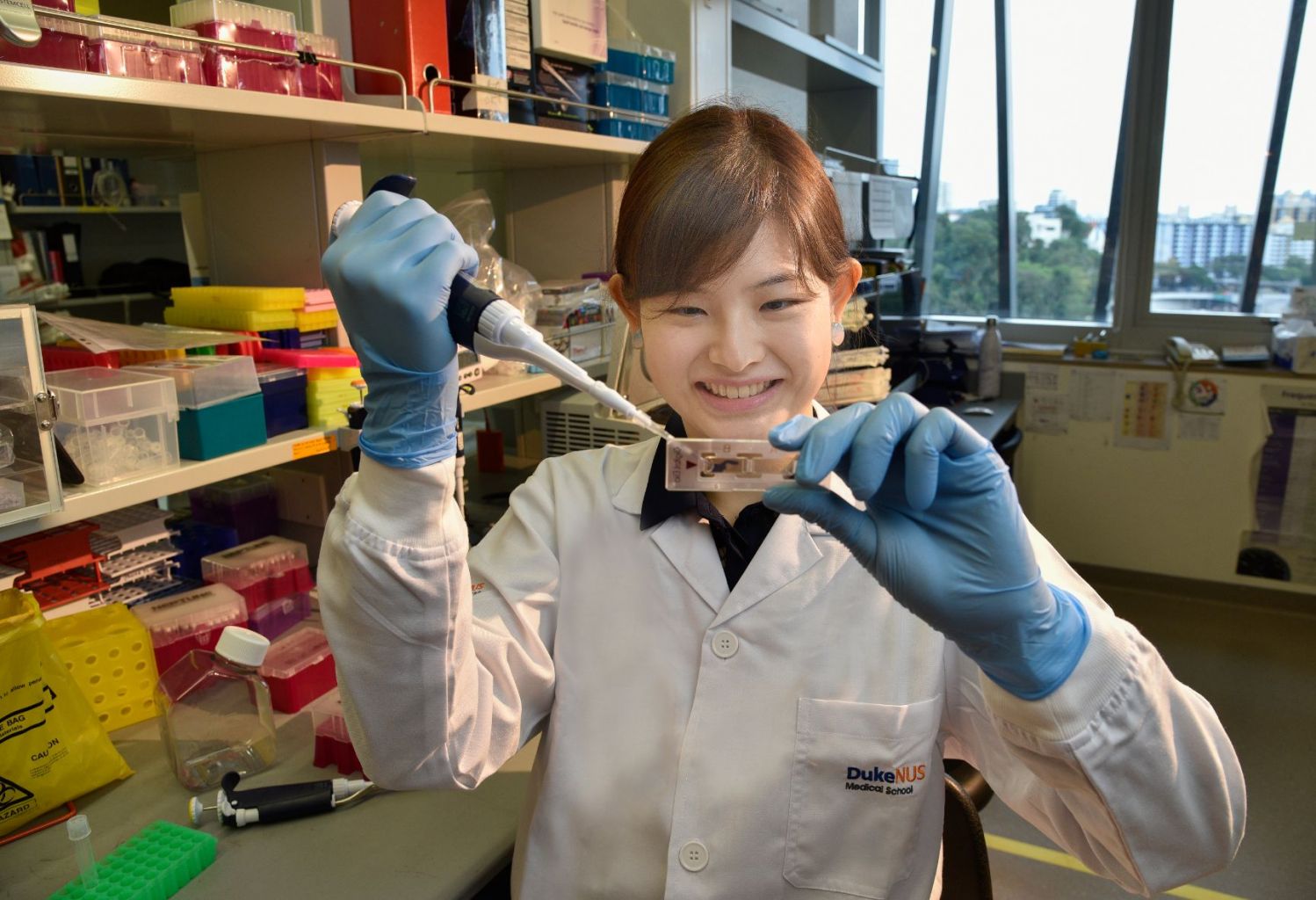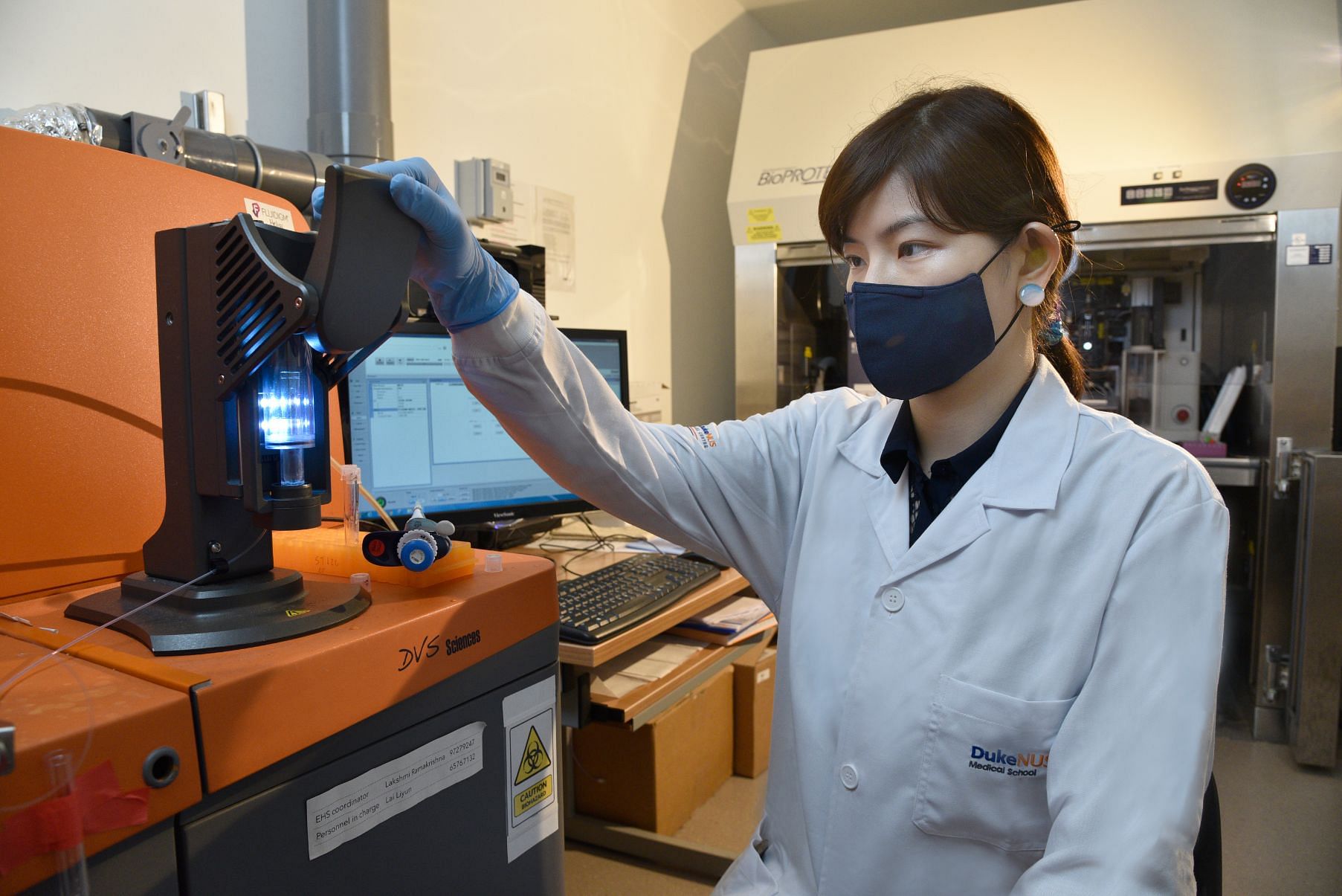BRANDED CONTENT
She’s a first generation immigrant from Myanmar who wants to make a positive impact through medicine and scientific research
Fifth-year Duke-NUS student Katherine Nay Yaung hopes that her training in both the clinical and research aspects will put her in an ideal position to take translational research to the next level

Ms Katherine Nay Yaung applied to join the MD-PhD programme at Duke-NUS Medical School during her final year studying life sciences at the National University of Singapore.
PHOTO: WEE TY
As a first generation immigrant from Myanmar, Ms Katherine Nay Yaung has always felt inspired by the fortitude of the people living there.
The 27-year-old Singaporean says: "Whenever I go back to visit family, I see the people in Myanmar living life to the fullest despite the difficult circumstances some of them face. This made me want to do something that could make a positive contribution to humankind."
Having developed an interest in scientific research after participating in science mentorship programmes in secondary school, as well as medicine after volunteering in hospitals, she decided to pursue both at the graduate level.
During her final year studying life sciences at the National University of Singapore (NUS), Ms Nay Yaung applied to join the MD-PhD programme at Duke-NUS Medical School. She was accepted and started right after she graduated from NUS.
"Pursuing medicine (treating people's body and mind) and research (improving current medical treatments) provides me with an ideal balance. Both fields put together also offer an elegant blend of the humanities and science, which are areas that I'm highly interested in," she explains.
From bench to bedside, and bedside to bench
Duke-NUS' MD-PhD programme combines medical education with research training to develop clinician-scientists who interface between medicine and science.
Senior Associate Dean for Graduate Studies Silke Vogel says that the school leads biomedical research with the goal to improve lives through innovations for treatment and prevention of diseases.
To that end, Duke-NUS offers three distinct, but complementary, PhD programmes - Integrated Biology and Medicine (IBM), Quantitative Biology and Medicine (QBM), and Clinical and Translational Sciences (CTS).
IBM, the most established among the three, is a joint degree programme between NUS and Duke University. Its main focus is for students to study disease mechanisms and translational concepts (building on basic scientific research to create new therapies, medical procedures, or diagnostics). Students work in the laboratories of Duke-NUS' world-class faculty to unravel new mechanistic insights into the pathophysiology of diseases.
QBM is centred on deep dives into the research areas of bioinformatics, biostatistics, and health data; while CTS provides the opportunity to focus on translational and clinical patient-oriented research projects. CTS is especially appropriate for clinicians who want to advance their research skills and become clinician-scientists.
Prof Silke notes that the PhD programmes strive towards training students to become competent and skilled researchers and prepare them for a successful career. The programmes focus on early immersion into the research environment, strong mentorship by the Duke-NUS faculty, a research-centred curriculum, and a strong graduate student community.
The Duke-NUS difference
PhD students have the advantage of working in a highly collaborative research environment with world-class faculty whose members publish regularly in internationally renowned journals, and whose novel research findings have led to patents and start-up companies.
Students also benefit from a strong mentoring environment. Each student has a dedicated faculty mentor, who trains and guides him or her and prepares the person to take the next career step. Each student also meets regularly with an advisory committee to receive additional guidance and feedback on research projects.
Duke-NUS also places a high value on verbal and written communication skills, which is fostered by a unique coursework where students learn to present their findings and write grant proposals to a broad scientific audience. Lastly, the school has also built an effective career development programme that aims to provide students with opportunities to explore choices and acquire soft skills.
Most importantly, unlike what one usually experiences at larger institutions, research at Duke-NUS is not organised by department (such as biochemistry or molecular biology) but centred on five disease areas and health outcomes that are important to Singapore and the region.
These five areas focus on cancer and stem cell biology, cardiovascular and metabolic disorders, emerging infectious diseases, neuroscience and biohavioural disease, and health systems and services research. This structure provides targeted research opportunities in both basic and translational sciences in these important disease areas.

Ms Nay Yaung, now a third-year IBM student working on the immunology of adult and pediatric lupus, says she has had the chance to explore many research areas. Her current interests include autoimmune diseases, immunology, metabolism, neurobiology, and regenerative medicine.
"Duke-NUS was my first choice for a PhD programme. It's an ideal place to do translational research due to its strong signature research programmes as well as proximity to Singapore General Hospital (SGH). This opens more doors for collaborations between the clinical ('bedside') and scientific ('bench') aspects, thus facilitating 'bench to bedside' and 'bedside to bench' research," she points out.
One of the highlights of her time at Duke-NUS comes from the numerous opportunities to share her research with both her peers within the school as well as renowned scientists in Singapore and around the world through conference presentations or informal sessions. These allow her to better understand the applicability and relevance of her research in the real world.
Being able to interact with scientists outside her field has also broadened her perspectives and inspired new ideas and ways of doing things in her own research. Ms Nay Yaung has found it a joy working with the many talented individuals in her laboratory, especially under the mentorship of thesis adviser Professor Salvatore Albani as well as supervisor Assistant Professor Yeo Joo Guan.
She adds that many activities (both academic and non-academic) are also organised for students in the IBM programme, encouraging exchange of scientific knowledge and formation of strong friendships. These in turn form the foundation of a strong support system, which she thinks is very important when doing a PhD.
"It takes a village to raise a PhD student as it is a long and challenging, albeit fulfilling, journey. You need to surround yourself with people whom you can turn to, and it's important to take a well-deserved break when required," Ms Nay Yaung says.
Personal and professional growth
In addition to pursuing her research interests, the IBM programme has allowed Ms Nay Yaung to grow in many unexpected ways, both personally and professionally.
Professionally, the programme has encouraged her to think outside the box, especially since the area she is now working in was relatively new to her when she started. The PhD programme has also inspired her to pick up new scientific skills and techniques such as methods to analyse big data - the use of bioinformatics to make sense of complex, high-dimensional data.
She has also experienced personal growth, especially in terms of learning to be more adaptable. For instance, she admits that she is still learning how to better estimate the length of time needed for her experiments. She also finds time to participate in other school-based activities such as peer tutoring and serving as the president of the MD Student Council.
The skills that she has attained professionally have also served her well in a personal capacity. They have cultivated her ability to approach problems innovatively, which can increase efficiency and reduce redundancy.
After she graduates from Duke-NUS, Ms Nay Yaung plans to pursue a clinical residency in Singapore before returning to the field of research. She hopes to build a strong foundation in clinical skills to bolster her eventual aim to partake in both clinical medicine and scientific research.
She notes that while Singapore's biomedical-science landscape has improved by leaps and bounds over the past two decades, more can be done in the field of translational research.
"As part of a small group of people trained in both the clinical and research aspects, we are in an ideal position to bring positive changes to and lead translational research to the next level, for example in terms of bridging 'bench' and 'bedside'," she says.
"In the process, I hope to spread the beauty of medicine and science with more people, especially the next generation."



